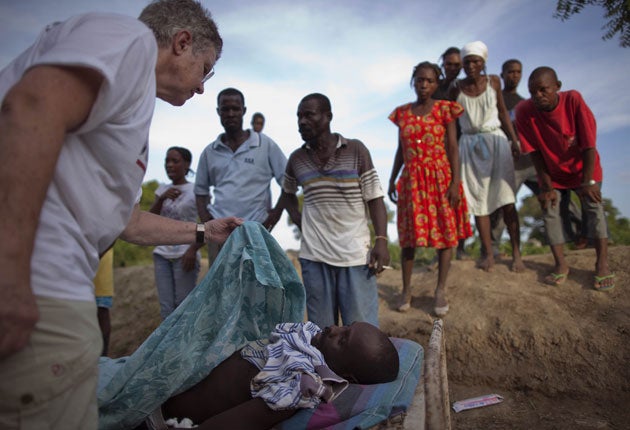Cholera kills 200 on island of quake victims
Fears are growing that disease could spread to the thousands still having to endure squalid temporary camps in Haiti's capital

Your support helps us to tell the story
From reproductive rights to climate change to Big Tech, The Independent is on the ground when the story is developing. Whether it's investigating the financials of Elon Musk's pro-Trump PAC or producing our latest documentary, 'The A Word', which shines a light on the American women fighting for reproductive rights, we know how important it is to parse out the facts from the messaging.
At such a critical moment in US history, we need reporters on the ground. Your donation allows us to keep sending journalists to speak to both sides of the story.
The Independent is trusted by Americans across the entire political spectrum. And unlike many other quality news outlets, we choose not to lock Americans out of our reporting and analysis with paywalls. We believe quality journalism should be available to everyone, paid for by those who can afford it.
Your support makes all the difference.An outbreak of cholera has spread outside a rural valley in central Haiti, intensifying worries that the disease could reach squalid camps housing thousands of earthquake survivors in the capital. By early yesterday, nearly 200 were confirmed dead in the Caribbean nation's worst health crisis since January's natural disaster. Authorities said more than 2,000 people were sick with the disease.
The first two cholera cases outside the central Artibonite region were confirmed on Friday in Arcahaie, a town closer to the quake-devastated Port-au-Prince. Experts were also investigating possible cases in Croix-des-Bouquet, a suburb of the capital, and radio reports said there were 24 cases of diarrhoea on Gonave Island.
The central region is the country's breadbasket and took in tens of thousands after the earthquake. The Artibonite River, which irrigates all of central Haiti, is believed to be contaminated.
"It will be very, very dangerous," said Claude Surena, president of the Haitian Medical Association. "Port-au-Prince already has more than 2.4 million people, and the way they are living is dangerous enough already."
This is the first cholera epidemic in Haiti in a century, the World Health Organisation (WHO) said. Jon Andrus, deputy director of the Pan American Health Organisation's regional office for the Americas, said that the number of cases will continue to grow because Haitians do not have built-up immunity to cholera.
Aid groups and the government are rushing in relief supplies, including 10,000 boxes of water purification equipment, according to WHO.
The Ministry of Health has confirmed 194 deaths and a total of 2,364 cases of cholera, said Imogen Wall, a spokeswoman for the UN Office for the Co-ordination of Humanitarian Affairs. "It's concentrated in Artibonite and we're doing our best to keep it that way," she said.
Dozens of patients lay on the floor awaiting treatment at the St Nicholas hospital in the seaside city of St Marc on Friday, some of them brushing away flies on mattresses stained with human faeces. One, 55-year-old Jille Sanatus, was brought in by his son, Jordany, the night before. A doctor was struggling to insert a needle into his arm. "He's completely dehydrated. It's hard to find the vein," said Dr Roasana Casimir She had been working with minimal rest since the outbreak became apparent on Wednesday.
Soon after she found the vein and fluid from an intravenous bag fed into Mr Sanatus's body, but half an hour later the father of 10 was dead. Two employees carried the body to the morgue behind the hospital and placed it on the ground for the family to reclaim it for a funeral. Mr Sanatus's son said the family had been drinking water from a river running down from the central plateau region. Alex Larsen, Haiti's health minister, said on Friday that the river tested positive for cholera.
Ms Wall said sick patients and contagious remains of the dead were not being sufficiently quarantined. "People are moving around, and there hasn't been proper isolation at the clinics," she said.
The sick come from across the Artibonite Valley. The region took in thousands of refugees following the earthquake which killed as many as 300,000 people. The capital is 45 miles south of St Marc. Most new arrivals were taken in by host families. Cholera was not present in Haiti before the earthquake, but experts warned that conditions were ripe for disease to strike in areas with limited access to clean water.
"Because of the earthquake, the situation requires a high level of attention in case the epidemic extends," said Michel Thieren, a programme officer for the Pan American Health Organisation.
Cholera is a bacterial infection spread through contaminated water. It causes diarrhoea and vomiting which can lead to dehydration and death within hours. Mr Larsen urged the sick to make their own rehydration serum out of salt, sugar and water.
Subscribe to Independent Premium to bookmark this article
Want to bookmark your favourite articles and stories to read or reference later? Start your Independent Premium subscription today.
Join our commenting forum
Join thought-provoking conversations, follow other Independent readers and see their replies
Comments